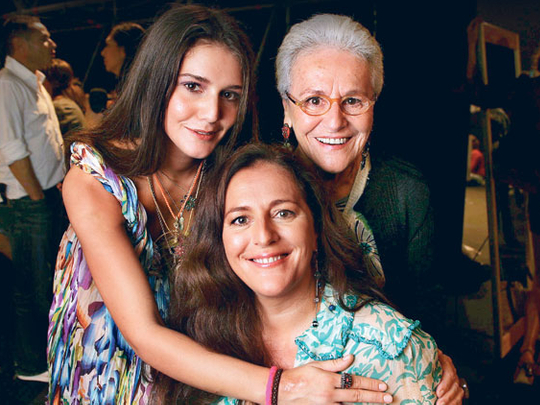
Forty minutes north of Milan, in the town of Sumirago, I've come to see the Missonis, one of Italy's most respected fashion dynasties, to find out what it's like to work in a family business that has three generations working side by side. There's Rosita, the founder and matriarch, her daughter Angela, the company's creative director, and Angela's daughter Margherita, who has recently produced her first full accessories collection.
The business, founded in 1953, may be a glamorous one — but the issues raised by working together will be familiar to anybody with a family firm.
"I won't speak if I have to be interviewed at the same time as them," says Margherita, 27, pointing to her mother and grandmother. "If they are around I can't talk really the way I want to."
There is nothing unusual about needing to break away from your family in order to express yourself. Her mother did the same when she was younger, and so Rosita, 78, and Angela, 51, take Margherita's statement in good grace, retiring to another room. But although Margherita may not want to be interviewed with them, she doesn't mind having them around otherwise.
There is no shortage of fashion dynasties in Italy and most have colourful pasts. Gucci, for instance, was notorious for infighting in the early years after it was founded in 1921, and run by Guccio Gucci with his sons: there were disputes over inheritances, stockholdings and day-to-day operation of the stores. Then there are the Versaces: Gianni was murdered in Miami in 1997, prompting a period of soul-searching within the family. His sister Donatella now runs the company, while the chairman is her other brother Santo. Donatella's daughter, Allegra, owns a 50 per cent stake.
The Missonis have survived the years intact, with no scandals, shootings or skeletons falling out of the cupboard. And they remain in control, having resisted buyouts — unlike, say, the Fendis. As Angela says: "We have grown with the cult of the family. To my mother that was the most important achievement. Family harmony was always her goal."
A small, spry woman whose energy, vital face and darting eyes belie her approaching 80th birthday, Rosita grew up in a family that owned a factory producing shawls, dyeing and embroidering fabrics.
Rosita met her husband, Ottavio, known as Tai, at the 1948 Olympic games in London — he was an athlete who made it to the final of the 400 metre hurdle race. He also had a small knitting factory that produced the Italian Olympic team tracksuits. After Tai and Rosita married, they bought some yarn-spinning machines that Rosita realised would give them far more creative potential with colour and pattern. The first dress sold under the name of Missoni came out in 1958, a knitted shift on which the weave was complex, creating the Missoni look — a dazzle of colours and patterns in finely woven yarns that prompted Diana Vreeland, the legendary editor of US Vogue, to exclaim: "Who said there are only colours? There are also tones!"
Missoni compound
For the Missoni family, work and family life have always been intertwined. Rosita and Tai set up the business in the basement of their first home.
Over the years they acquired more and more land and built up what Angela calls the Missoni compound.
Rosita's children were all married in this house, and it was here that the Missonis decided to hold fashion shows in the early days: "We held the menswear shows here — we covered over the tennis courts to do it and served dinner. In those days Florence was the centre of Italian fashion no one came to Milan. But they came for our shows, even though we always had bad weather.
"We lived at a fantastic moment," she adds, recalling the late 1960s and the birth of pret-a-porter, of which Missoni was a pioneer. "Mix and match became our look and we experimented with all sorts of weaves and methods space dyeing, tie dyeing..."
As the family grew and the company thrived, Tai and Rosita influenced the direction of fashion as casually as they let their children play in the factory. "The factory was our playground," says Angela, "just as it has been for my children."
Margherita says: "I went to my first fashion show at the age of two, so Missoni's aesthetic is inside me, part of me. My mother, grandmother and I all have different styles, but we share the same taste."
Rosita remains very much involved in the company but handed over creative direction to her youngest child, Angela, in 1996. Missoni had enjoyed global success but the 1980s saw a slump, as the sharp edges and sculpted shoulders of the decade failed to chime with the Missoni label's soft lines.
Margherita takes up the story: "My grandmother has always said fashion is for the young or the extremely passionate. By then she had had enough and she didn't think it was right to go on like that."
But Angela had long ago strayed from the family firm: "I was such a rebel when I was younger," she says. "I wanted to prove myself away from them. I concentrated on having children instead. That was my great passion and I had three while I was quite young."
But the apple had not fallen far from the tree and by 1992, Angela was designing her own collections. "All my clothes were plain blocks of dark colours — no colours or patterns. Then after I had done about five collections of my own, my mother said: ‘What you are doing is how I want Missoni to look now.'"
‘Part of us'
Angela's arrival reinvigorated the brand, and she, in turn, found the brand was in her blood: "We have all grown up within the company. I know every collection we have done, I never need to refer to an archive. Missoni is part of us, not something we have to study to understand."
But she feels that being the youngest child saved her from parental expectations. "They were very supportive of me staying home with the kids."
Angela seems relaxed around both her mother and her eldest daughter, whom she clearly adores. But she says: "I was worried for Margherita, I know it can be quite heavy to have this heritage. So I was happy to give her space to make her own decisions. I am very glad that she has made her own choice to come into the company — and at only 26. It took me until I was 32!"
As for Margherita, she cites her grandmother as her biggest influence. "She has been almost a second mother to me. I spent a very big part of my childhood with her: on holidays around the world, in her woods searching for mushrooms, around flea markets, going to the opera, picking flowers in the fields. Most of my aesthetic has been passed on to me directly by her. We are very close," she says.
Margherita's parents divorced when she was seven and she rebelled, becoming very religious for many years. Later, she went to the US to study philosophy and then acting. "I wanted to make it on my own," she says, "so I moved to New York for five years.
"It can be suffocating to be part of such a strong clan — one might feel one only exists as part of that and not as an individual. People expect things of you when you have this name."
But just as Missoni seduced Angela, Margherita was eventually intrigued by it too. "For years I used to worry very much about my grandmother's judgment [about my joining the label]," she explains. "But now I have solved these issues, I have much less of a hard time being around them on a daily basis — although working with your family can be tough in any case. One tends to expect much more from the people we love. But I know I wouldn't be where I am today if I wasn't part of this family.
"It's not just a company to me, there is something that has to do with the notion of belonging to a clan, a tribe, and somewhere there is also a chip related to pride. I realise with age that priorities change and I have a great passion for Missoni," she says.
"Sometimes I refer to my family as my biggest blessing in life — it has definitely saved me a few times by keeping me grounded. You have a reason to go home at night when you have a grandma to call on Sunday morning. And knowing there is a place where they love you unconditionally, where you can always go back to no matter what, that's quite a comfort."







